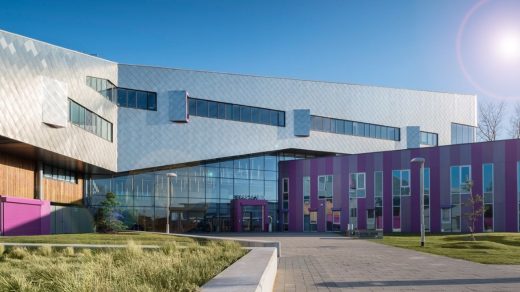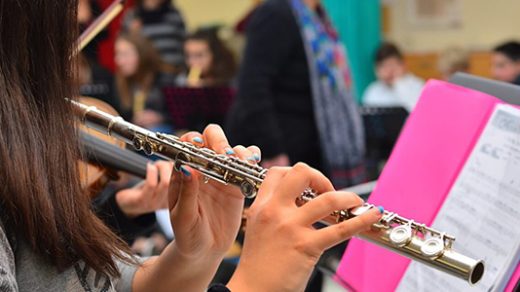Dermot McNiffe, Academy of St Francis of Assisi
A good school with outstanding features and in the top 10% of schools nationally for improvements in GCSE English and mathematics. The Academy of St Francis of Assisi has improved students results since it opened in 2005 and this is thanks in part to the principal Dermot McNiffe whose passion for helping students achieve their full potential saw him follow his vocation into the world of education.
Next to Newsham Park in the borough of Kensington and Fairfield, Liverpool sits an academy which specialises in the environment and sustainability. With its own solar atrium and solar panels the academy even produces some of its own electricity. The academy not only inspires students to impact upon the outside world it is also raising its students’ ambitions and aspirations year-on-year. Dermot McNiffe, principal of the Academy of St Francis of Assisi, came to teaching later in life. Originally an engineer for British Aerospace, he worked as a patternmaker and computer programming engineer before deciding at the age of twenty-seven to turn to teaching for a more fulfilling career.After completing his training as a technology teacher with first-class honours he worked for ten years at an all-boy’s high school in Trafford before taking the role as principal of St Francis of Assisi in 2008. It is a role which he says has been the highlight of his career and which has seen his passion to help students achieve their full potential realised. “I always wanted to work in an inner-city school and make a difference where it was really needed,” says Dermot.“Every single year in my four years of tenure standards have risen and more than that we have raised the aspirations of young people in our local community.”Originally set up as part of the regeneration of Kensington, an area of well documented underachievement and deprivation in Liverpool, the school was opened in 2005 and since then student’s results and aspirations have been on the up and up. Recently recognised by The Specialist Schools and Academies Trust as in the top 10% of schools nationally for improvements in GCSE results, the school now sees 98% of pupils achieve five or more good GCSE results at A* – C, which has risen from just 57% in 2008.The schools latest OFSTED inspection in November 2012 saw the school graded as ‘good overall’ with ‘outstanding’ elements in its education provision. One of the outstanding elements is the academy’s commitment to its specialism of sustainability and the integration of Student Voice (the schools council) within the decision making processes. Students regularly sit in on staff interviews, senior leadership meeting and even governors meetings to make sure their voices are heard in all aspects of school development. “They even sat in on my interview’ says Dermot, “We often find that they arrive at the same decisions as we have. The most recent thing that Student Voice told us was that they wanted a sixth form to allow them to continue their education up to the age of 19 at the academy. We have listened to our students and families and we have worked hard to make this happen so that in September 2013 our new sixth form will be opening to a large proportion of our students.”The sixth form, grounded in the academy’s distinct Christian ethos, will offer study options for 16-19 year olds from BTECS to academic A-Levels. The sixth form will be geared towards the future growth of industries in areas such as the sciences and technology in Liverpool and, as always, the academy will be highlighting its specialism in the environment and sustainability.“I see the future of our sixth form being quite groundbreaking in terms of what we could do in teaching, says Dermot. “For example how we look at methods of manufacturing through using sustainable materials in conservation projects related to construction and environmental science. The new sixth form will be focussed on reaching out into the community.“ In the spirit of self-sufficiency for the future, the academy’s photovoltaic solar cells produce 5% of its own electricity, a valuable teaching tool for students. The academy has its own gardens including a roof-top garden for the teaching of horticulture, conservation and life sciences. Students’ work from this extends into conservation projects in the local community and parklands. The academy’s hard work has not gone unnoticed and it has received a plethora of awards recognising its achievements including the Green Flag Award for the environment. Students even recently took part in a regeneration of Newsham Park, which saw them give part of the Victorian garden, originally built in 1868, a spring clean alongside members of the local community. Staff, students and community volunteers re-painted benches, weeded and re-planted existing planting areas in the park which had become overgrown with weeds. The group also dug and planted four new wild flower beds to brighten up the park. The academy’s commitment to science is clear and GCSE achievement in these subjects is well above national average. The academy also reaches further into the community offering adult education classes to learners in Kensington and Fairfield.But getting back to the core job of the school, Dermot believes that strong Christian values, caring for the environment and with a strong achievement culture raises aspirations and inspires the students to serve their community. “The main thing for us is that students take their education and Christian values to impact on the world in a positive way, working to improve things for the future.”




